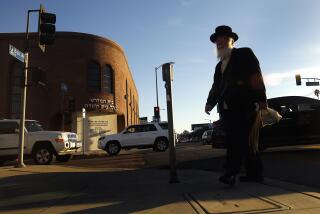Orthodox Rabbis Push for Compliance With Traditional Jewish Law
- Share via
Southern California’s leading Orthodox rabbinic body has tightened its policies regarding conversions and weddings, moves that reflect a new willingness on the part of Judaism’s most traditional branch to aggressively assert itself as it continues to gain adherents in Los Angeles.
In recent months, the Rabbinical Council of California has decided that non-Jews wishing to convert to Orthodox Judaism must be sponsored by the rabbi of an Orthodox synagogue located within walking distance of their home.
The council also has passed a resolution prohibiting its members from officiating at weddings at which non-kosher food is served. While always frowned upon, the practice has in the past been “widespread” locally, according to Rabbi Dov Aharoni of Beit Hamidrash Congregation in Woodland Hills.
Both measures were pushed within the rabbinical council by younger members, such as Aharoni, who are more outspoken about their beliefs than previous generations of Los Angeles Orthodox leaders who received less support within their community when taking strong stands.
“This is no longer the wild, wild West,” said Rabbi Alan Kalinsky, an executive board member who also directs the West Coast operation of the Union of Orthodox Congregations. “The local Orthodox community has matured to the point where it should maintain strict standards.”
Rabbi Pinchos Gruman, rabbinical council president, said rank-and-file members of Los Angeles’ Orthodox congregations have also pushed for rigorous compliance with traditional Jewish law in recent years. “It’s not just the rabbis,” he said. “There’s been a swing in Los Angeles from, let’s say, semi-Orthodox to real Orthodox. The congregations themselves have become aggressive about this.”
Rabbi Mark Angel, first vice president of the Rabbinical Council of America, the California council’s New York-based parent body, said the emerging confidence of Los Angeles’ Orthodox community mirrors what is happening nationally.
“Standards are being made tighter around the country,” he said. “The feeling is if you set higher standards, people will rise to them.”
In the last decade, Los Angeles’ Orthodox community has become the nation’s second largest, after New York. In 1979, the Jewish Federation Council of Greater Los Angeles estimated that only about 5% of the city’s 500,000 Jews were Orthodox. Today, according to Orthodox leaders, 10% to 15% of Los Angeles’ almost 600,000 Jews are Orthodox.
The local spurt in Orthodox numbers has resulted, in part, from migration to the city, but also because of the spread of the ba’alei teshuva movement, in which formerly non-observant Jews adopt Orthodoxy.
The Rabbinical Council of California has about 40 members. Most live in Los Angeles, but Orange County and San Diego Orthodox rabbis also belong. Its membership includes every prominent mainstream Orthodox rabbi in the region.
The move to tighten conversion standards was designed to weed out converts who do not intend to abide by Orthodox Judaism’s stringent life style requirements and is tied to the “Who is a Jew?” debate in Israel. That issue centers around whether people who receive a non-Orthodox conversion will be recognized as Jews in Israel should they wish to settle there. Orthodox rabbis who control religious life there have pushed for a law that would not recognize non-Orthodox conversions.
Most American Jews who are affiliated with a synagogue are either Reform or Conservative, both of which are more liberal in their religious approaches. Leaders of these two denominations have angrily denounced Orthodoxy for its stand on the conversion issue. Aharoni said that “since this issue became hot there’s been a growing number of people asking for Orthodox conversions who have no intention of being Orthodox. This is particularly so among Israeli men who have married non-Jews, but are afraid that if they go home their children will not be considered Jewish.” Orthodox Judaism traces religious heritage through the mother.
Halacha, or the traditional Jewish religious law followed rigidly by Orthodox Jews, prohibits worshipers from driving to synagogue on the Sabbath and major holidays. While possible to maintain an Orthodox life style without regularly attending synagogue, Aharoni said “the practical reality is it is so hard to do that you are not going to be fully observant if there is no synagogue, no community to help maintain the commitment.”
The tougher standard makes it particularly hard for Jews living in Los Angeles’ outlying suburbs to gain an Orthodox conversion because of the scarcity of Orthodox synagogues in most areas. However, the council will allow limited exceptions to the new rule if a member rabbi is willing to vouch for the sincerity of an applicant.
The action concerning officiating at weddings where non-kosher food--food not prepared according to Jewish dietary laws--is served underscores the differences existing between some of Orthodoxy’s old guard in Los Angeles and its younger leaders.
Because of opposition to the measure from older rabbis, some of whom viewed the measure as a criticism of their actions, no clear sanctions were included in the final resolution, which was narrowly approved by the council. Each transgression will be reviewed by a council committee, Aharoni said.
“There was defensiveness, but there was also a genuine concern on the part of those who opposed this that should an Orthodox rabbi say he will not officiate, the couple will just get a non-Orthodox rabbi to marry them,” said Gruman, the council president. “Then the entire marriage would be unkosher by Orthodox standards, not just the food.”
Aharoni said Orthodox rabbis in Los Angeles have long been pressured by influential members of their congregations to officiate at weddings at which the food was non-kosher. And so, he said, rabbis were forced to choose between ignoring what they considered a serious violation of traditional law, or refusing to officiate and risking problems for themselves within their congregation.
Gruman, who also is the rabbi at Young Israel of Los Angeles, a Fairfax area congregation, said the growth in recent years of high-quality kosher caterers in Los Angeles has made it harder to justify serving non-kosher food at an Orthodox wedding.
Southern California spokesmen for Conservative and Reform Judaism said their more liberal denominations allow driving to synagogue on the Sabbath and holidays and do not have any regulations covering food served at weddings.
However, Conservative Rabbi Paul Dubin, executive vice president of the Board of Rabbis of Southern California, said that “more and more Conservative rabbis are insisting on kosher food before they will commit to performing a wedding.”
And Rabbi Lennard Thal, regional director of the Reform Union of American Hebrew Congregations, said while “all Reform temples that I know of would prohibit the serving of prohibited foods (such as pork) on their premises, the vast majority would not prohibit the serving of non-prohibited foods even if they have not been fully prepared according to the dietary laws.”
More to Read
Sign up for Essential California
The most important California stories and recommendations in your inbox every morning.
You may occasionally receive promotional content from the Los Angeles Times.










